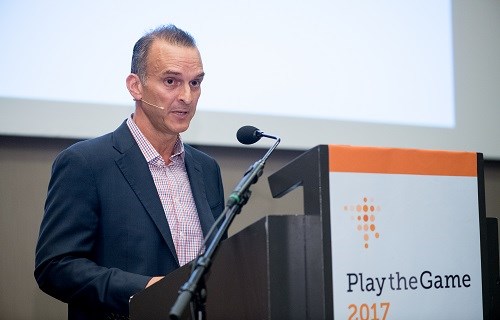USADA pushes for government sanctions against Russia

Travis Tygart speaking at Play the Game 2017.
Photo: Thomas Søndergaard/Play the Game.
16.03.2018
By Mads A. WickstrømAs a response to a perceived failure by the International Olympic Committee (IOC) to sanction Russian individuals involved in the state-sponsored doping programme in 2014, the United States Anti-Doping Agency (USADA) is exploring the possibilities of utilising the Global Magnitsky Act to sanction Russian officials involved in the doping scandal, reports The New York Times.
In 2016, the United States Congress passed the Global Magnitsky Human Rights and Accountability Act (Global Magnitsky Act), a law designed to impose sanctions on human rights abusers and corrupt parties or individuals globally. The law calls, inter-alia, for individuals who have committed human rights violations or substantial corruption to be prevented from obtaining visas and excluded from using the American financial system.
“What happened in Sochi was the worst case of corruption that we’ve ever seen in sport, so why shouldn’t the act apply to us? We have to look down every avenue if we’re working for clean athletes, particularly in light of the IOC’s failure to do anything,” USADA chief executive, Travis Tygart, told The New York Time.
Earlier this week, Tygart participated in a workshop, sponsored by the US Helsinki Commission, in Washington to study whether the Global Magnitsky Act could apply to the Russians.
According to the New York Times, among the people who could be targeted for sanctions are former Minister for Sports, Vitaly Mutko along with Yuri D. Nagornykh, former deputy sports minister; Irina Rodionova, former deputy director of the Center for Sports Preparation and others mentioned in an affidavit by the whistleblower, Grigory Rodchenkov, who served as Russia’s anti-doping laboratory chief during the Sochi Games in 2014.
Corruption in sport under the Global Magnitsky Act – a feasible alternative?
Whether the US government will use the Global Magnitsky Act to sanction Russian officials remains to be seen. However, according to William Browder, an investor who has previously worked with the US Congress on the Magnitsky Act, corruption in sport rises to the level covered by the law.
“There’s one important issue and that’s the doping scandal at the Sochi Games led to what I believe were murders. There were a number of people involved who died very suspiciously who were most likely liquidated to cover up a crime,” Browder explained in an interview with The New York Times.
“There were people who effectively ruined institution of sport and have committed crimes to do so. That would reach the standard of Global Magnitsky, in my opinion. These people involved in sports doping, they’re shameless. So there needs to be really hard consequences. They need to pay a very dear price,” Browder underlined.
According to Travis Tygart, sanctioning Russian officials under the Global Magnitsky Act is indeed a “viable option”.
Should USADA be successful in its call to penalise Russian officials, under the Global Magnitsky Act, it would not be the first time the US government steps up to ‘police’ the international sporting world.
For instance, in 2015, the US Justice Department took the lead and indicted a number of FIFA officials and businessmen for racketeering, conspiracy and corruption involving payments worth up to $150 million.
Most of the schemes in the indictment related to the solicitation and receipt of bribes by football officials from sports marketing executives in connection with the commercialisation of the media and marketing rights associated with various football matches and tournaments.





